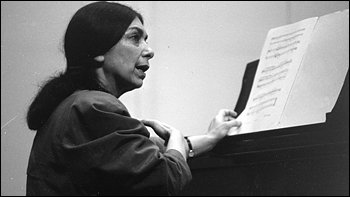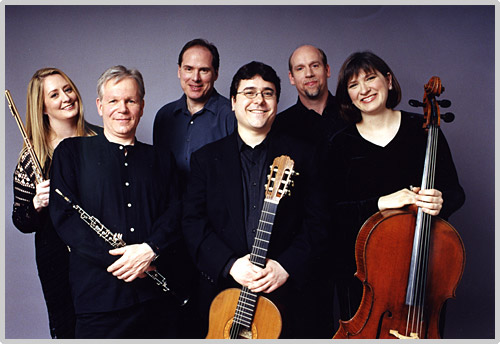By Stephen Brookes • The Washington Post • March 8, 2012
The composer and pianist Dina Koston was one of the driving forces behind new music in Washington for decades, launching the Theater Chamber Players — the Kennedy Center’s first resident chamber ensemble — in 1968, and performing and promoting young composers widely before her death in 2009. That legacy is continuing with a new endowment at the Library of Congress called the Dina Koston and Roger Shapiro Fund for New Music, and on Wednesday the library opened a two-day tribute to Koston with a performance by the Cygnus Ensemble that featured her final work — paired with a short play by Samuel Beckett that inspired it — and a premiere of the endowment’s first commission. Dina Koston“Ohio Impromptu” is quintessential Beckett: minimal and elementally powerful. A haunting meditation on loss, memory and regret, it received a finely shaded performance by Ted van Griethuysen and Steve Nixon. Koston’s “Distant Intervals” for chamber ensemble, which immediately followed, was inspired by the play, but you needed to scrunch your ears up a bit to hear the connection. In contrast with the monochromatic tone and spare, coiled drama of the Beckett play, Koston’s piece was colorful and discursive, a kaleidoscope of ideas posed and questioned, of wistful fragments that rose and subsided and rose again, always changing.
Dina Koston“Ohio Impromptu” is quintessential Beckett: minimal and elementally powerful. A haunting meditation on loss, memory and regret, it received a finely shaded performance by Ted van Griethuysen and Steve Nixon. Koston’s “Distant Intervals” for chamber ensemble, which immediately followed, was inspired by the play, but you needed to scrunch your ears up a bit to hear the connection. In contrast with the monochromatic tone and spare, coiled drama of the Beckett play, Koston’s piece was colorful and discursive, a kaleidoscope of ideas posed and questioned, of wistful fragments that rose and subsided and rose again, always changing. The Cygnus EnsembleChester Biscardi’s delicate and beautiful “Resisting Stillness” for two guitars opened the second half of the program, which also featured Koston’s borderline-cutesy “A Short Tale” for soprano and piano, the gentle “Berceuse elegiaque” by Ferruccio Busoni and Frank Brickle’s “Farai un vers.” But by far the freshest and most original work on the program was David Claman’s “Gone for Foreign.” Written during a stay in India, it’s a collection of vibrant, wildly evocative pieces — a little messy around the edges but told in a wonderfully warped and completely engaging musical language. An intriguing composer worth hearing more from.
The Cygnus EnsembleChester Biscardi’s delicate and beautiful “Resisting Stillness” for two guitars opened the second half of the program, which also featured Koston’s borderline-cutesy “A Short Tale” for soprano and piano, the gentle “Berceuse elegiaque” by Ferruccio Busoni and Frank Brickle’s “Farai un vers.” But by far the freshest and most original work on the program was David Claman’s “Gone for Foreign.” Written during a stay in India, it’s a collection of vibrant, wildly evocative pieces — a little messy around the edges but told in a wonderfully warped and completely engaging musical language. An intriguing composer worth hearing more from.
The choice of Mario Davidovsky as the first recipient of a commission from the Koston Fund, on the other hand, was a bit of a disappointment. Not that he’s a bad composer; his “Ladino Songs” were elegantly done and polished to a fine gleam, which is what you’d expect from a well-established composer in his late 70s with a Pulitzer and positions at Harvard and Yale under his belt. It’s all well and good to honor the elders — but why not aim that funding at young composers out there on the front lines?